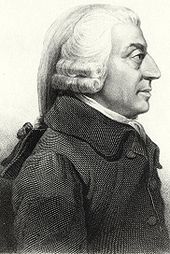Economic liberalism refers to the maximum role of markets and competitive forces in an economy.
The state’s role is limited to the establishment of the necessary framework in which markets can operate and to the provision of services which private enterprise cannot provide.
Also see: laissez-faire
Origins

Adam Smith was an early advocate for economic liberalism
Arguments in favor of economic liberalism were advanced during the Enlightenment, opposing mercantilism and feudalism. It was first analyzed by Adam Smith in An Inquiry into the Nature and Causes of the Wealth of Nations (1776) which advocated minimal interference of government in a market economy, although it did not necessarily oppose the state’s provision of basic public goods.[12] In Smith’s view, if everyone is left to his own economic devices instead of being controlled by the state, the result would be a harmonious and more equal society of ever-increasing prosperity.[1] This underpinned the move towards a capitalist economic system in the late 18th century and the subsequent demise of the mercantilist system.
Private property and individual contracts form the basis of economic liberalism.[13] The early theory was based on the assumption that the economic actions of individuals are largely based on self-interest (invisible hand) and that allowing them to act without any restrictions will produce the best results for everyone (spontaneous order), provided that at least minimum standards of public information and justice exist. For example, no one should be allowed to coerce, steal, or commit fraud and there is freedom of speech and press.
Initially, the economic liberals had to contend with the supporters of feudal privileges for the wealthy, aristocratic traditions and the rights of kings to run national economies in their own personal interests.[citation needed] By the end of the 19th century and the beginning of the 20th, these were largely defeated. Today, economic liberalism is associated[by whom?] with classical liberalism, neoliberalism, right-libertarianism and some schools of conservatism such as liberal conservatism.[citation needed]
Position on state interventionism
Economic liberalism opposes government intervention on the grounds that the state often serves dominant business interests, distorting the market to their favor and thus leading to inefficient outcomes.[14] Ordoliberalism and various schools of social liberalism based on classical liberalism include a broader role for the state, but they do not seek to replace private enterprise and the free market with public enterprise and economic planning.[15][16] A social market economy is a largely free market economy based on a free price system and private property, but it is supportive of government activity to promote competitive markets and social welfare programs to address social inequalities that result from market outcomes.[15][16]
Historian Kathleen G. Donohue argues that classical liberalism in the United States during the 19th century had distinctive characteristics as opposed to Britain:
[A]t the center of classical liberal theory [in Europe] was the idea of laissez-faire. To the vast majority of American classical liberals, however, laissez-faire did not mean no government intervention at all. On the contrary, they were more than willing to see government provide tariffs, railroad subsidies, and internal improvements, all of which benefited producers. What they condemned was intervention in behalf of consumers

Thank you for another magnificent post. Where else could anyone get that kind of info in such an ideal way of writing? I have a presentation next week, and I am on the look for such info.
I have recently started a web site, the information you provide on this web site has helped me tremendously. Thank you for all of your time & work.
A big thank you for your blog.Much thanks again. Awesome.
Fantastic site. Lots of useful info here. I’m sending it to several friends ans additionally sharing in delicious. And obviously, thank you in your sweat!|
If some one needs to be updated with hottest technologies therefore he must be pay a quick visit this web site and be up to date every day.|
I apologise, I can help nothing, but it is assured, that to you will help to find the correct decision.